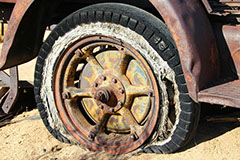Car Care Tips From Mr. Tire
Here, at Mr. Tire, we want our customers to be in the know about how to properly care for their car or truck. We want you to understand why and how your tires wear; how to get the best gas mileage; and overall how to get the most out of your tires. Hopefully, with these helpful tips you will be able to improve gas mileage and reduce tire wear when driving in and around the Midwest and Great Plains states. We understand how important your vehicle is and why your car needs to be serviced by an auto repair shop. So give us a call today to schedule your next maintenance appointment.
Car Maintenance and Care
• Change your fluids on time, every time.
• Change your oil every 3,000 miles for regular, 5,000 miles for synthetic oil
• Change antifreeze fluid every 30,000 miles.
• Change brake fluid every 30,000 miles.
• Change transmission fluid every 30,000 miles.
• Schedule a maintenance check every 15, 30, 60, and 90,000 miles.
• Replace your air filter every 12 months or 12,000 miles (whichever comes first).
• Replace your fuel filter every 2 years or 24,000 miles (whichever comes first).
(These are simply recommendations. For vehicle-specific maintenance and service, please refer to your vehicle owner's manual.)
Tire Maintenance and Care
•  Rotate your tires every 5,000 miles or every 6 months.
Rotate your tires every 5,000 miles or every 6 months.
• Check your tire pressures approximately once a week. Low tire pressures can affect fuel economy, handling and comfort. To accurately measure your tire pressure, check tires when they are cold. Wait at least three hours after driving.
• Always make sure that your wheels are properly aligned. Badly aligned wheels will lead to dragging of the car on the road.
• Check your spare tire each month and keep it properly inflated so it's ready to go when you need it most.
• Use the penny trick to determine if the tread on your tires is worn too low. Take a penny and put Abraham Lincoln's head into one of the grooves of the tread. If part of his head is covered by the tread, you're ok. If you can see all of his head, it's time to replace the tire. When the tread is worn down to 1/16 of an inch, tires must be replaced.
v
Gas Mileage Tips
• Check and/or change your air filter every 6 months to improve fuel economy and keep your engine running smoothly.
• Don't top off. Don't bother topping off when filling your car's gas tank. Any additional gas is just going to slop around or seep out.
• Tighten up that gas cap. Gas will evaporate from your car's gas tank if it has an escape. Loose, missing or damaged gas caps cause 147 million gallons of gas to evaporate each year.
• Go for the shade. The hot summer sun that makes the inside of your car feel like a sauna also evaporates fuel from your gas tank.
• Use the right oil. You can improve your car's gas mileage by 1 percent to 2 percent by using the manufacturer's recommended grade of motor oil.
How to Check Tire Pressure
Keeping your tires properly inflated helps to decrease tire wear and improve gas mileage. The U.S. Department of Transportation has estimated that 5 million gallons of fuel per day is wasted due to low tire pressure. This quick fix could easily save over 2 billion gallons of gas a year!
Here are our easy steps to check your tire pressure:
• Invest in an accurate tire gauge and keep it in your car.
• Determine the accurate tire pressure for your vehicle. The best place to find this information is in the driver's side door jam on a yellow sticker or by consulting your owner's manual. Be sure to note if your vehicle requires different pressure levels for the back and front tires.
• The best time to check your tire pressure is first thing in the morning when your tires are cold. Tires heat up as you drive and it takes them about a half hour for them to cool down.
• Remove your vehicle's valve cap and be sure to set it somewhere where you won't lose it!
• Press the tire gauge into the valve stem. It is only necessary to press down for just a few seconds to get an accurate reading.
• Your tire pressure will be displayed on the gauge. It can be helpful to jot down the levels for all of your tires. Tire pressure is measured in psi (pounds per square inch).
Should your tire pressure need to be adjusted,
all of our Mr. Tire locations have free air available for your use during our regular business hours.